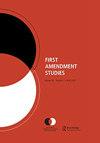走向思想的话语市场:重塑社交媒体、假新闻和人工智能时代的市场隐喻
Q2 Social Sciences
引用次数: 9
摘要
摘要:思想市场隐喻仍然是最高法院传达对言论自由理解的最持久的工具之一。近一个世纪以来,在第一修正案法律的几个领域,包括商业言论、诽谤和淫秽内容,来自各种司法哲学的法官们一直呼吁用这个比喻来帮助他们传达最终成为对修正案保护的关键解释。然而,隐喻并没有固定的含义。鉴于典型的社会和技术变革的重要考虑,这些变革极大地改变了社会思想市场的本质,特别是在社交媒体、假新闻和人工智能传播者的时代,本文探讨了如何在忠实于作者对真理本质的理解的同时,对市场隐喻进行重新解释和想象,以解释21世纪截然不同的信息环境。为此,本文考察了奥利弗·温德尔·霍姆斯大法官是如何理解真理的,考虑了启蒙运动和基于话语的对民主社会中交流流动的理解之间的差异,并探讨了最高法院传统上是如何使用隐喻的。最后,它提出了一个修改后的思想市场概念,最终被标记为“话语市场”本文章由计算机程序翻译,如有差异,请以英文原文为准。
Toward a discursive marketplace of ideas: Reimaging the marketplace metaphor in the era of social media, fake news, and artificial intelligence
ABSTRACT The marketplace of ideas metaphor remains one of the Supreme Court’s most enduring tools for communicating understandings regarding freedom of expression. For nearly a century, justices from a variety of judicial philosophies, in several areas of First Amendment law, including commercial speech, defamation, and obscenity, have called upon the metaphor to help them convey what have ultimately become crucial interpretations regarding the Amendment’s protections. Metaphors, however, do not have static meanings. In light of the important considerations of paradigmatic social and technological changes that have substantially altered the very nature of the marketplace of ideas in society, particularly in the era of social media, fake news, and artificially intelligent communicators, this essay examines how the marketplace metaphor can be both reinterpreted and reimagined to account for a substantially different twenty-first-century information environment while remaining faithful to its author’s understandings about the nature of truth. To this end, this essay examines how Justice Oliver Wendell Holmes understood truth, considers differences between Enlightenment and discursive-based understandings regarding the flow of communication in democratic society, and explores how the Supreme Court has traditionally employed the metaphor. Finally, it proposes a revised conceptualization of the marketplace of ideas, ultimately labeled as the “discursive marketplace.”
求助全文
通过发布文献求助,成功后即可免费获取论文全文。
去求助
来源期刊

First Amendment Studies
Social Sciences-Law
自引率
0.00%
发文量
0
期刊介绍:
First Amendment Studies publishes original scholarship on all aspects of free speech and embraces the full range of critical, historical, empirical, and descriptive methodologies. First Amendment Studies welcomes scholarship addressing areas including but not limited to: • doctrinal analysis of international and national free speech law and legislation • rhetorical analysis of cases and judicial rhetoric • theoretical and cultural issues related to free speech • the role of free speech in a wide variety of contexts (e.g., organizations, popular culture, traditional and new media).
 求助内容:
求助内容: 应助结果提醒方式:
应助结果提醒方式:


